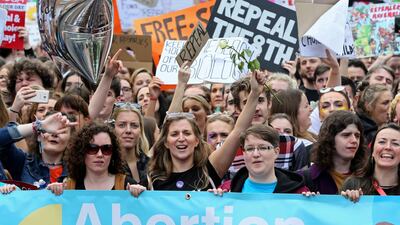Ireland will seek to overcome a decades-long national divide over the provision of abortion services to women by holding a referendum to permit the practice in May.
Currently abortion is only allowed if the mother’s life is at risk and many women are forced to travel to Britain to end a pregnancy
In a political leap of faith, Irish Prime Minister Leo Varadkar has announced that he will campaign to widen access to abortions, as has the leader of the major opposition party.
"I know this will be a difficult decision for the Irish people to make," Mr Varadkar said.
"I know it is a very personal and private issue and for most of us it is not a black-and-white issue, it is one that is grey - the balance between the rights of a pregnant woman and the foetus or unborn.
"For my part I will advocate a Yes vote. My own views have evolved over time - life experience does that."
Ahead of the vote, the country's health minister Simon Harris will draft legislation outlining how new rules around abortion could be set out. It is believed to propose that unrestricted abortion should be accessible for women who are up to 12 weeks pregnant, and in exceptional circumstances after. Pregnancies as a result of rape and incest are currently not allowed to be aborted, nor is an abortion permitted if there is a fatal foetal abnormality.
The late night cabinet decision to hold the vote was unanimous, despite several ministers opposing unrestricted access to abortion up to 12 weeks.
The ballot will not be on specific terms of any new law, rather it will look at whether to repeal the constitutional amendment that bans terminations.
The amendment which could be repealed "acknowledges the right to life of the unborn". This gives parity to the lives of the woman and her unborn child.
Currently thousands of women in Ireland travel abroad for terminations or took illegal and unsafe pills ordered online at home, something that Mr Varadkar, the country's former health minister who trained as a doctor, acknowledges.
He said abortions in Ireland were "unsafe, unregulated and illegal".
"The saddest and loneliest journey is made by Irish women who travel to foreign countries to end their pregnancies. That doesn't have to happen," he said.
__________________
Read more
Women's March 2018: Celebrities show solidarity for women's rights
Trump tweets about women's marches as protesters gather
Merriam-Webster's word of the year for 2017: 'Feminism'
__________________
Mr Varadkar is presented as a modernising leader with strong youth support, but the his support for unrestricted abortion is high risk thanks to its divisive nature.
Pro Life Campaign spokesperson, Dr Ruth Cullen said: "It is a very sad and serious moment for our country. Tonight, the Government brought forward a proposal that for the first time in our history would withdraw basic human rights from a group of vulnerable defenceless individuals instead of strengthening their constitutional protections. They can't disguise the fact that what’s being proposed is solely about stripping unborn babies of all meaningful legal protections”.
Some pro-life campaign groups have suggested that proposed reforms would lead to the birth of fewer children with Down Syndrome. In response, Mr Harris told RTE Radio it is "somewhat offensive" to suggest that women would choose to terminate a pregnancy due to a diagnosis of a disability.
However, human rights and women’s rights groups have welcomed the decision.
Colm O’Gorman, Executive Director of Amnesty International Ireland, said: “We are heartened at today’s government backing for legislation framed around a 12-week ‘on request’ model for abortion access, with later gestational limits in specific circumstances. This is a further sign of real political will to put women’s and girls’ bodily autonomy firmly at the centre of abortion law reform.
“We are on the cusp of a once-in-a-generation opportunity to use our voices and votes to stand up for the human rights and equality of women and girls.”
The Women’s Equality party, a feminist political party in the UK, said they commended “the women in Ireland who have campaigned to make this referendum happen”.
"Women will never have equality until they have full control over their bodies, and so we offer our full support to those pushing for repeal of the eighth amendment,” said a representative.
The British Pregnancy Advisory Service said: "The fact that Ireland is holding a referendum on this issue is to be warmly welcomed. We hope very much that it will pave the way to a framework which enables women to access the abortion services they need. Women in Ireland already have abortions – but they either have to travel to the UK to undergo a procedure, at considerable physical and emotional stress, or take their chances buying abortion medication online. Finally there is the opportunity to change this, and we believe Irish voters will seize the chance to do just that".
Online, people have rallied around #repealthe8th, a reference to the Article that could be repealed.
One supporter of reform, Mary Buckley, wrote: “Every woman that travelled, every frightened girl alone taking pills, every devastated parent bearing a terrible diagnosis and dumped by their country: their shadow hangs over this press conference. 35 years of stigma, humiliation, pain & fear #repealthe8th”
A recent poll conducted by an Irish newspaper has shown a significant move in public opinion since the mid-1980s, when the Catholic Church held more influence over public views.
Last year, long-running calls for the laws to be changed resulted in a special cross-party parliamentary committee and public assembly which both recommended repealing the amendment.
A firm majority of all voters said they would vote in favour of a constitutional change, with 56 percent voting that they would opt for reform. Less than a third were not in favour and 15 percent said they did not know or offered no opinion.
An exact date for the referendum will be decided once it has been debated in the Irish parliament.

